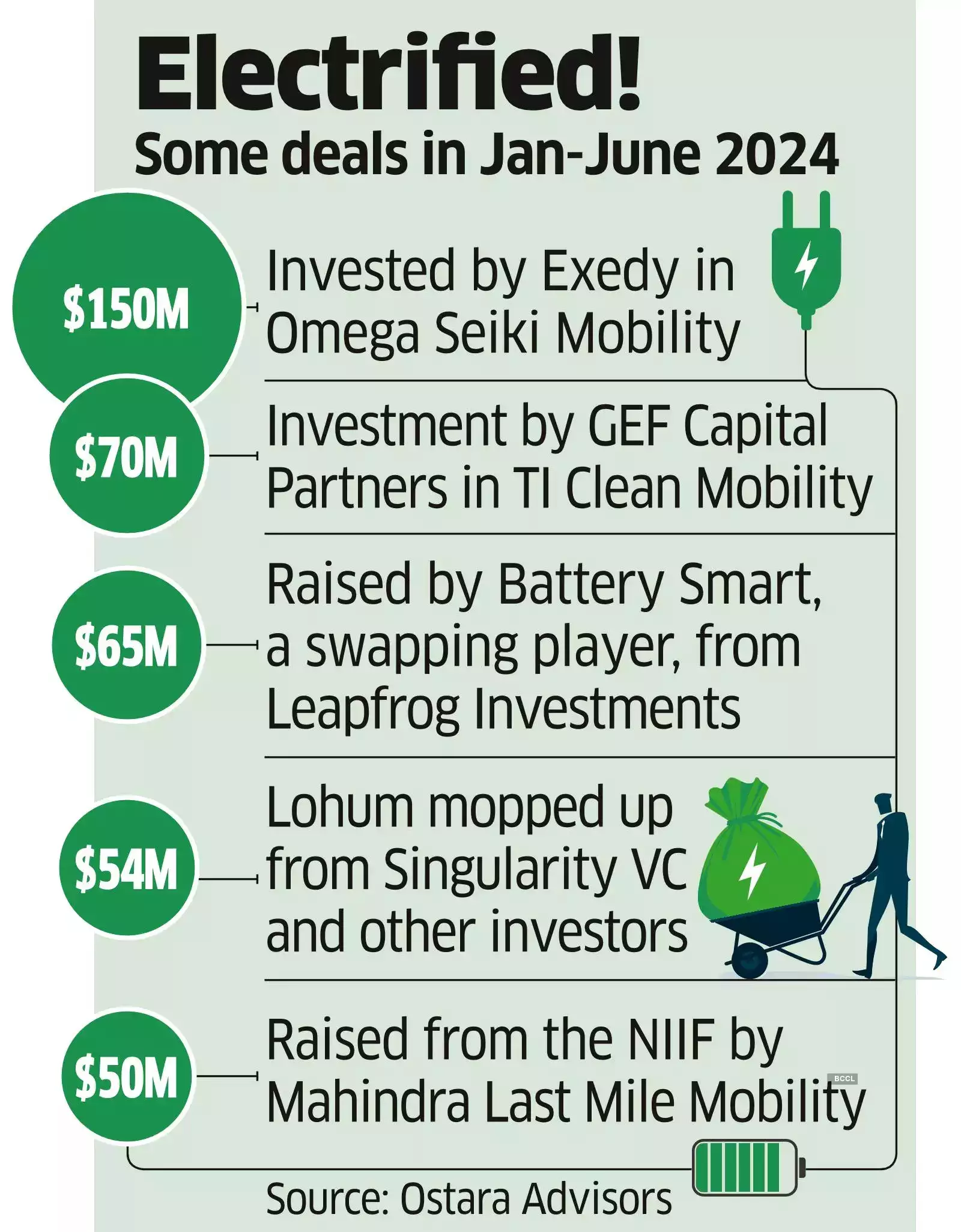
Private equity (PE) firms are ramping up investments into India's electric two- and three-wheeler industry to gain a share of the emerging market. This comes amid a slowdown in electric passenger vehicle sales in the first six months of 2024 from the year earlier due to higher prices, range anxiety and inadequate charging network. Electric cars are also facing competition from hybrids, experts say.
Total funding announced in the first half of 2024 surged nearly 17% to about USD 754 million. This includes inflow of USD 423.5 million into the electric two- and three-wheeler industry, and small commercial vehicle makers, as well as USD 330 million in the EV ecosystem which includes EV financing, battery swapping, charging infrastructure, EV fleets, battery recycling, and EV parts, according to data collated by Ostara Advisors, an electric mobility focussed investment bank.
Some of the top deals include Exedy's USD 150 million bet on Omega Seiki Mobility, an electric three-wheeler and small truck OEM, and a USD 70 million investment by GEF Capital Partners into TI Clean Mobility.
Policy uncertainty
Other funding deals include USD 50 million raised by Mahindra Last Mile Mobility from the National Infrastructure Investment Fund (NIIF); USD 54 million by Lohum, a battery recycling firm, from Singularity VC and other investors; and USD 65 million by Battery Smart, an EV battery swapping company, from Leapfrog Investments.
Electric two-wheeler sales in the country increased 21% from a year earlier during January-June 2024 to 527,254 units, according to the government's Vahan portal.
Electric two-wheeler penetration saw a rise of 6% in June as compared to 5% in May.
"Despite the policy uncertainty in the last few months, cumulative sales of electric two-wheelers and three-wheelers have grown during January-June over the same six-month period last year, driven by greater availability of good quality products that deliver performance, strong word of mouth around TCO (total cost of ownership) specially in the commercial vehicle segment, and ease of charging as two- and three-wheelers do not require special charging infrastructure on a daily basis," said Vasudha Madhavan, founder of Ostara Advisors.

Slowing sales
However, electric passenger vehicle (PV) sales fell 13.5% from a year earlier in June, adding to a marginal drop in May. Sales during the January to June period declined 20% to 46,845 vehicles. It marks a sharp reversal for an industry that surged 135% in the first half of 2023.
Falling sales have sparked fears that the Indian market may be following trends in many Western nations where electric car sales are showing signs of slowing down, forcing companies to alter their production schedules and investment strategies.
More than half of electric PV makers reported lower sales in June. To be sure, these are on a very low base and the limited choice and high pricing could be potential sales deterrents.
"We would acknowledge that fleet owners and the commercial vehicle sector have faced challenges around higher upfront costs for EVs as well as finding appropriate sources of financing," said Abhishek Poddar, India country head at Macquarie Group.
Fleet operators are also worried about technology risk and the need to upskill their staff for setting up and managing vehicle charging infrastructure, he added.
To provide leasing and financing in the EV space, Macquarie recently launched EV leasing business Vertelo, which aims to deliver USD 1.5 billion to accelerate India's EV transition.
Macquarie Group also made a strategic investment into ChargeZone, a leading Indian EV charging company.
Barriers for adoption
Range anxiety and scarce charging infrastructure remain barriers for faster EV adoption.
With the government reducing subsidy, original equipment manufacturers raised prices, affecting buying decisions of potential buyers. The government should ensure policy continuity on EVs.
"A clarity on the EV policy will definitely ensure a stronger growth in EVs in India," Madhavan said.
Disclaimer: The copyright of this article belongs to the original author. Reposting this article is solely for the purpose of information dissemination and does not constitute any investment advice. If there is any infringement, please contact us immediately. We will make corrections or deletions as necessary. Thank you.





